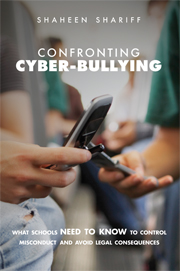 Confronting Cyber-Bullying
Confronting Cyber-Bullying Book contents
- Frontmatter
- Contents
- Figures
- Tables
- Preface
- Acknowledgments
- 1 Cyber Misconduct: Who Is Lord of the Bullies?
- 2 Profile of Traditional and Cyber-Bullying
- 3 Cyber Libel or Criminal Harassment: When Do Kids Cross the Line?
- 4 Student Free Expression: Do the Schoolhouse Gates Extend to Cyberspace?
- 5 Fostering Positive School Environments: Physical and Virtual
- 6 Censoring Cyberspace: Can Kids Be Controlled?
- 7 The Tragedy of the Commons: Lessons for Cyberspace?
- 8 Cyber Collaboration: Models for Critical Legal Pluralism in Teacher Education Programs
- Notes
- Cases
- Index
- References
8 - Cyber Collaboration: Models for Critical Legal Pluralism in Teacher Education Programs
Published online by Cambridge University Press: 02 July 2009
- Frontmatter
- Contents
- Figures
- Tables
- Preface
- Acknowledgments
- 1 Cyber Misconduct: Who Is Lord of the Bullies?
- 2 Profile of Traditional and Cyber-Bullying
- 3 Cyber Libel or Criminal Harassment: When Do Kids Cross the Line?
- 4 Student Free Expression: Do the Schoolhouse Gates Extend to Cyberspace?
- 5 Fostering Positive School Environments: Physical and Virtual
- 6 Censoring Cyberspace: Can Kids Be Controlled?
- 7 The Tragedy of the Commons: Lessons for Cyberspace?
- 8 Cyber Collaboration: Models for Critical Legal Pluralism in Teacher Education Programs
- Notes
- Cases
- Index
- References
Summary
A legal rule is legitimate only to the extent that it can capture people's imaginations and make them believe it is worth engaging with and participating in the normative framework proposed. Moreover, the legitimacy of a legal rule depends on a minimum functionality common to all rules: its capacity to effectively capture, shape, and refract parties' perceptions of problems. In brief, a legal rule ceases to be a command and instead becomes a hypothesis of action and interaction.
(Macdonald & Kong, 2006, p. 22)INTRODUCTION
In Chapter 7, I explained that according to Hart's (1997) legal positivism perspective, the task of the legal subject is simply to follow the list of instructions that have been stamped and certified as the law in accordance with the principles of legality. Consequently, legal subjects are presented as being similar to employees in a company who carry out the tasks they have been assigned by their manager not out of fear of punishment but, quite simply, because the boss says so. In the educational context, this is doubly problematic because as important as it is for there to be a certain level of order in the way students communicate online or in class, if that level of order comes at the expense of students being able to develop a healthy ability to question formal authority, then they will miss an important lesson in their development, both as thinkers and citizens.
- Type
- Chapter
- Information
- Confronting Cyber-BullyingWhat Schools Need to Know to Control Misconduct and Avoid Legal Consequences, pp. 212 - 248Publisher: Cambridge University PressPrint publication year: 2009
